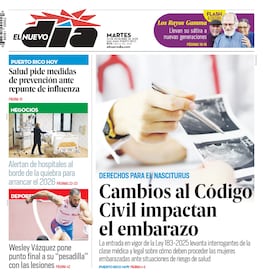The evident increase in the cost of living, especially during the summer, has exposed the precarious situation of long-term care facilities for the elderly and people with disabilities who require assistance to live independently.
---
Lee este artículo en español.
---
The increase in bills for basic services such as electricity and drinking water impacts most severely on the most vulnerable sectors of society. This situation further hinders the already growing need for specialized care, putting at risk the quality of institutions that provide welfare and security to the elderly population in Puerto Rico.
According to a United Nations (UN) report, Puerto Rico ranks seventh in the world in terms of the proportion of older adults over the age of 65. On the other hand, compared to other Latin American and Caribbean countries, the island has one of the lowest birth rates (2.5 children per woman), which poses a challenge in terms of generational renewal and survival.
These economic demands also include families who have taken on the responsibility of caring for their elderly in their own homes. Such responsibility, in many cases, means postponing or foregoing a well-deserved retirement after years of work.
The cost of hiring professional caregivers can be overwhelming, adding up to an average of $2,000 per month. To get a sense of the commitment, one person responsible for the private care of an Alzheimer’s patient estimated that, after 10 years, he provided 7,500 hours of care.
In this context, it is difficult to determine the exact number of elderly people in distress, with dramatic cases recorded in hospitals, private residences and even the unfortunate reality of those who end up wandering in the streets.
The collaboration between thousands of families and the institutions dedicated to this purpose requires solid support, greater attention and decisive government intervention to guarantee the necessary resources to this growing group of Puerto Ricans who should be a priority in the country’s social agenda. Given this complex scenario, it is essential that the government implement both short- and long-term measures to mitigate this problem.
Organizations that provide essential services for the quality of life of this sector of the population have requested subsidies for basic services such as water and electricity, in addition to other considerations that may alleviate the burden of operating expenses. Measures are also proposed to help cover the food needs of the residents.
In addition to government intervention, it is essential that families consider budget adjustments to support aspects such as the supply of products necessary for the care of their loved ones in specialized centers. Close collaboration with the staff working in these facilities is equally crucial.
It would be prudent to strengthen alliances with nonprofit organizations that can provide financial and technical support and volunteer services to avoid precarious situations in these centers that are insufficient to serve a growing population that demands these services in Puerto Rico. We are facing a reality that does not admit delay and that, as an act of pure humanity, we cannot leave behind.
---
This content was translated from Spanish to English using artificial intelligence and was reviewed by an editor before being published.


